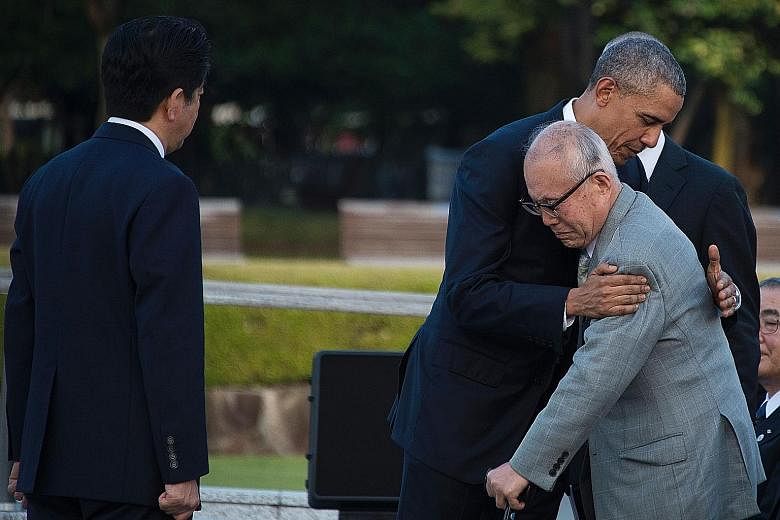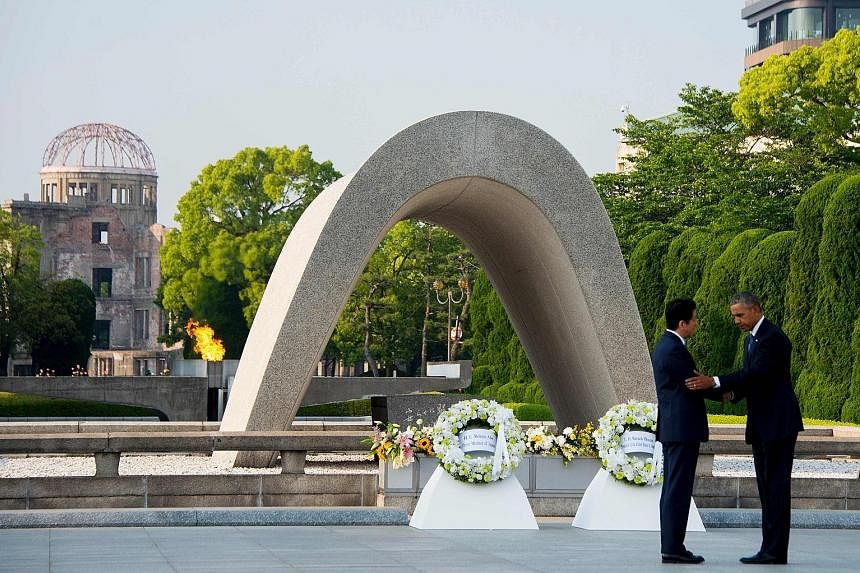HIROSHIMA (Japan) • United States President Barack Obama laid a wreath at the Hiroshima Peace Memorial yesterday, telling an audience that included survivors of America's atomic bombing in 1945 that technology as devastating as nuclear arms demands a "moral revolution".
"Technological progress without an equivalent progress in human institutions can doom us," Mr Obama said, adding such technology "requires a moral revolution as well".
In an emotional moment after his speech, Mr Obama embraced and shook hands with survivors of the attack, which ushered in the nuclear age and exposed humanity to risks the President believes the world must do far more to resolve.
The first was Mr Sunao Tsuboi, a chairman of the Hiroshima branch of the Japan Confederation of A- and H-bomb Sufferers Organisations, who gripped Mr Obama's hand and would not let go until he had spoken to him for some time. "I held his hand, and we didn't need an interpreter," Mr Tsuboi, 91, said later. "I could understand what he wanted to say by his expression."
As crows called through the hush of the Hiroshima Peace Memorial Park, Mr Obama offered a floral wreath at the cenotaph, pausing with his eyes closed and his head lowered. Japanese Prime Minister Shinzo Abe followed by offering his own wreath and a silent bow.
For weeks, the White House had refused to say if Mr Obama, the first sitting US president to make the trip, would meet survivors. It was a delicate calculus. Many survivors long for an apology, and there were small demonstrations nearby by protesters demanding one.
The bombing claimed the lives of 140,000 people. A second nuclear bomb destroyed the city of Nagasaki three days later.
People in Asian countries that were brutalised by imperial Japan had warned that a presidential apology at Hiroshima would be inappropriate. Chinese state media said that the "atomic bombings of Japan were of its own making".
South Korean President Park Geun Hye, now on a tour in Africa, has not commented on Mr Obama's visit. Nuclear-armed North Korea ridiculed his visit to Hiroshima as the "childish" diplomatic ploy of a "nuclear war maniac".
Mr Obama not only did not apologise for the attack, but also made clear that Japan, despite a highly advanced culture, was to blame for the war, which "grew out of the same base instinct for domination or conquest that had caused conflicts among the simplest tribes".
In his speech, Mr Abe said: "This tragedy must not be allowed to occur again. We are determined to realise a world free of nuclear weapons."
Mr Obama said the bombing of Hiroshima demonstrated that "mankind possessed the means to destroy itself" and called for humanity to change its mindset about war.
"The world was forever changed here, but today the children of this city will go through their day in peace," he said. "What a precious thing that is. It is worth protecting, and then extending to every child. That is a future we can choose, a future in which Hiroshima and Nagasaki are known not as the dawn of atomic warfare, but as the start of our own moral awakening."
NEW YORK TIMES, AGENCE FRANCE-PRESSE


